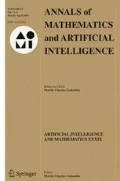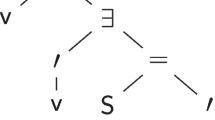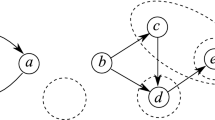Abstract
We explore which kinds of nonmonotonic inference relations naturally arise when using similarity-based implication and consistency measures to rank propositions à la Gärdenfors and Makinson or to build system of spheres in the sense of Lewis. There is no surprising result, the main interest being to provide a new perspective to nonmonotonic reasoning from a field which has not been traditionally considered.
Similar content being viewed by others
References
C. Alchourrón, P. Gärdenfors and D. Makinson, On the logic of theory change: Partial meet contraction and revision function, J. Symbolic Logic 50 (1985) 510-530.
S. Benferhat, D. Dubois and H. Prade, Nonmonotonic reasoning, conditional objects and possibility theory, Artif. Intell. 92 (1997) 259-276.
L. Biacino and G. Gerla, Generated necessities and possibilities, Internat. J. Intell. Systems 7 (1992) 445-454.
I. Bloch and J. Lang, Towards mathematical morpho-logics, in: Proc. of the 8th Internat. Conference IPMU, Madrid, Spain (2000) pp. 1405-1412.
D. Driankov and P. Doherty, A nonmonotonic fuzzy logic, in: Fuzzy Logic for the Management of Ucertainty, eds. L. Zadeh and J. Kacprzyk (Wiley, New York, 1992).
D. Dubois, Belief structures, possibility theory, decomposable confidence measures on finite sets, Comput. Artif. Intell. 5(5) (1986) 403-417.
D. Dubois, F. Esteva, P. Garcia, L. Godo and H. Prade, A logical approach to interpolation based on similarity relations, Internat. J. Approx. Reason. 17(1) (1997) 1-36.
D. Dubois, J. Lang and H. Prade, Possibilistic logic, in: Handbook of Logic in Artificial Intelligence and Logic Programming, Vol. 3, eds. D.M. Gabbay, C.J. Hogger, J.A. Robinson and D. Nute (Oxford Univ. Press, Oxford, 1994) pp. 439-514.
D. Dubois and H. Prade, Posibilistic logic, preferencial models, nonmonotonicity and related issues, in: IJCAI'91 (1991) pp. 419-424.
D. Dubois and H. Prade, Similarity-based approximate reasoning, in: Computational Inelligence Imitating Life, eds. J.M. Zurada, R.J. Marks II and X.C.J. Robinson (IEEE Press, Orlando, 1994) pp. 69-80.
D. Dubois and H. Prade, Comparison of two fuzzy set-based logics: similarity logic and posibilistic logic, in: FUZZ-IEEE'95, Yokohama, Japan, July 1995 (IEEE Press) pp. 1319-1326.
F. Esteva, P. Garcia, L. Godo and R. Rodriguez, A modal account of similarity-based reasoning, Internat. J. Approx. Reason. 16(3/4) (1997) 235-261.
L. Fariñas del Cerro, A. Herzig and J. Lang, From ordering-based nonmonotonic reasoning to conditional logics, Artif. Intell. 66 (1994) 375-394.
P. Gärdenfors, Knowledge in Flux: Modeling the Dynamics of Epistemic States (MIT Press, Cambridge, MA, 1988).
P. Gärdenfors and D.Makinson, Nonmonotonic inference based on expections, Artif. Intell. 65 (1994) 197-245.
H. Geffner, On the logic of defaults, in: Proc. of the 7th AAAI National Conf. on Artificial Intelligence, St. Paul (1988) pp. 449-454.
A. Grove, Two models for theory change, J. Philos. Logic 17 (1988) 157-170.
D. Lehmann, Stereotypical reasoning: logical properties, Logic J. IGPL 6(1) (1998) 49-58.
D. Lewis, Contrafactuals (Oxford Basil Blackwell, London, 1973).
D. Makinson, General patterns in nonmonotonic reasoning, Vol. 3, eds. Gabbay, Hogger and Robinson (1994) pp. 35-110.
I. Niiniluoto, Truthlikeness, Syntheses Library, Vol. 185 (Reidel, Dordrecht, 1987).
D. Nute and Ch. Cross, Conditional Logics, in: Handbook of Philosophical Logic, eds. D. Gabbay and F. Guenthner (Reidel, Dordrecht, 2000.)
J. Pearl, Probabilistic Reasoning in Intelligent Systems: Network of Plausible Inference (Morgan Kauffman, Los Altos, CA, 1988.)
E. Plaza, F. Esteva, P. Garcia, L. Godo and R. Lopez de Mantaras, A logical approach to case-based reasoning using fuzzy similarity relations, J. Inform. Sci. 106 (1998) 105-122.
R. Rodriguez, P. Garcia and L. Godo, Using fuzzy similarity relations to revise and update a knowledge base, Mathware Soft Comput. 3(3) (1996) 357-370.
E. Ruspini, On the semantics of fuzzy logic, Internat. J. Approx. Reason. 5 (1991) 45-88.
K. Schlechta, Nonmonotonic Logics. Basic Concepts, Results, and Techniques, Lecture Notes in Artificial Intelligence, Vol. 1187 (Springer, Berlin, 1997).
T.Williamson. First-order logics for comparative similarity, Notre Dame J. Formal Logic 29(4) (1988) 457-481.
M. Ying, A logic for approximate reasoning, J. Symbolic Logic 59(3) (1994) 830-837.
Author information
Authors and Affiliations
Rights and permissions
About this article
Cite this article
Godo, L., Rodríguez, R.O. Graded Similarity-Based Semantics for Nonmonotonic Inferences. Annals of Mathematics and Artificial Intelligence 34, 89–105 (2002). https://doi.org/10.1023/A:1014453222080
Issue Date:
DOI: https://doi.org/10.1023/A:1014453222080




